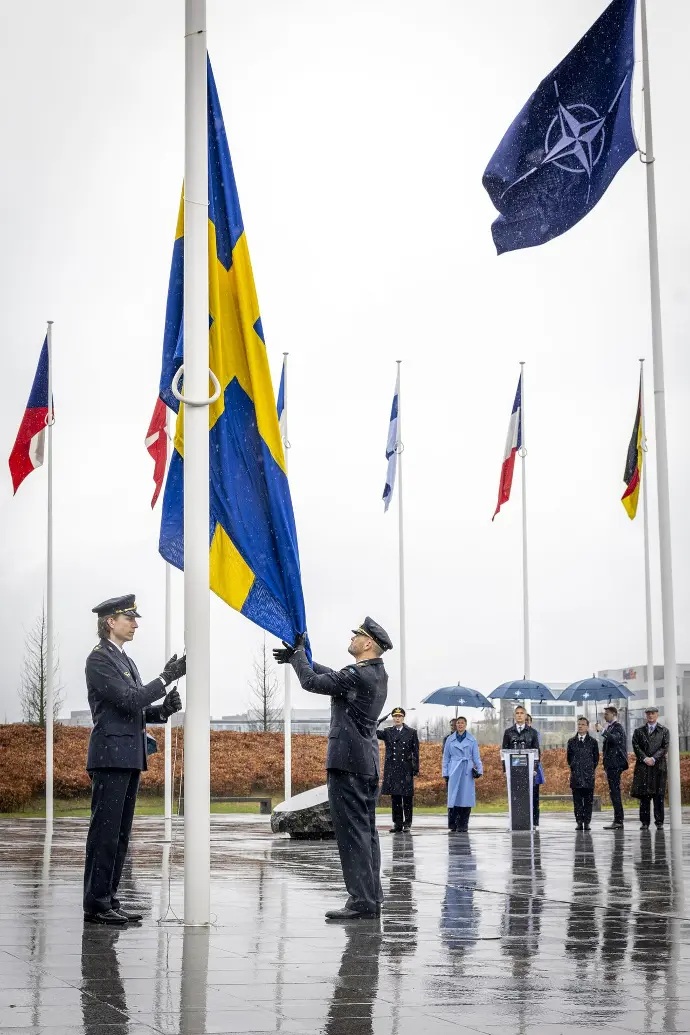Sweden has long maintained its position of neutrality in international conflicts. However, Russia's invasion of Ukraine in February 2022 prompted the Scandinavian country to join NATO in early 2024. Sweden is a small country, but its entry into the alliance makes a difference, both geopolitically and militarily.
NATO - the North Atlantic Treaty Organisation - is a military alliance founded in 1949 by the United States, Canada, the United Kingdom, Belgium, Denmark, France, Iceland, Italy, Luxembourg, the Netherlands, Norway and Portugal. Its aim was to block the expansion of the Soviet Union. The founding countries signed a treaty stipulating that ‘an armed attack against one or more of them... will be considered as an attack against all of them’. Belgium has been home to the Alliance's military and political headquarters since 1967.
Sweden and Finland both applied for NATO membership in May 2022, just three months after the cunning invasion of Ukraine. Finland, which has a 1,300km border with Russia, officially joined less than a year later, in April 2023. Sweden's accession was finally made official on 7 March 2024, when Swedish Prime Minister Ulf Kristersson handed over the accession documents to the US State Department (equivalent to the Ministry of Foreign Affairs) in Washington.
Sweden has long stood out for its ‘policy of neutrality and non-alignment, the foundations of which were laid by King Karl XIV Johan in 1812’. Foreign Minister Tobias Billström paid tribute to this policy in a statement to the Swedish government. This policy has been tested many times, but Russia's recent use of military force is too dangerous to ignore. According to the World Economic Forum's Global Risks Report 2024, armed conflict between nations is one of the greatest risks facing the world today.
‘The accession of Sweden and Finland to NATO is one of the biggest geopolitical changes in Europe since the fall of the Berlin Wall.'
– Tobias Billström, Swedish Minister for Foreign Affairs
The road to joining NATO has been an arduous one for Sweden. Two NATO member states - Turkey and Hungary - initially refused to give their consent. Turkey did not want to give Sweden the green light because of a dispute over Sweden's support for Kurdish separatists, whom Turkey considers to be a terrorist group. Hungary, meanwhile, finally lifted its veto after Prime Minister Ulf Kristersson visited Budapest and agreed to provide the country with four more Saab Gripen C fighters, as well as ten more years of technical and logistical support for the existing Hungarian fleet.
Following Russia's annexation of Crimea, NATO members decided in 2014 to devote at least 2% of their GDP to defence. By 2023, however, only 11 of the then 31 members of the alliance had met this target. This figure is expected to rise to 18 members by 2024. Sweden spent only 1.54% of its GDP on defence in 2023, but Billström said: ‘Sweden's defence spending will exceed 2% of GDP this year, which should be considered a minimum. We Europeans should take greater responsibility for transatlantic relations, thereby creating a stronger Europe within NATO.’
With Sweden's accession to NATO, Alliance members now encircle the Baltic Sea. This allows NATO to better control the region and monitor vital pipelines and undersea cables. Despite having a population of just 10 million, Sweden has an enviable military capability and considerable defence expertise. Its industry is export-oriented, giving NATO access to equipment it did not previously possess. The country has world-class military equipment, including Saab JAS 38 Gripen supersonic fighters, Gotland-class submarines and RBS15 anti-ship missiles. In addition to this equipment, Sweden has the fifth largest number of armoured personnel carriers in the alliance.

© NATO – The Swedish flag is raised at the accession ceremony on 11 March 2024.
Although NATO membership seems a natural step for Sweden, some are concerned about the change in identity it could bring. Kerstin Bergea, President of Svenska Freds- och Skiljedomsföreningen, the Swedish Association for Peace and Arbitration, said: ‘Sweden's voice, historically strong on issues of peace and disarmament, now seems to have died out. Yet peace activism is part of our DNA’. However, the Swedish government maintains that this decision is ‘fundamental to our security and freedom’ and that, like other Nordic countries, it sees ‘no reason to establish nuclear weapons or permanent bases on Swedish territory in peacetime’.
President Putin sought to stem any expansion of the alliance by invading Ukraine, supposedly in response to NATO's excessive proximity to Russia's borders. The accession of Sweden and Finland to the alliance was certainly not part of his plans. Indeed, Russia has threatened to take ‘political and military-technical countermeasures’. But NATO enlargement is not set to stop there. NATO Secretary General Jens Stoltenberg has said that Ukraine's membership of NATO is ‘inevitable’ once the war with Russia is over. Georgia and Bosnia-Herzegovina are also hoping to join the alliance.
‘When President Putin launched his massive invasion two years ago, he wanted less NATO and more control over his neighbours. He wanted to destroy Ukraine as a sovereign state. But he failed. NATO is bigger and stronger. And Ukraine has never been so close to NATO membership. As Ukrainians continue to fight bravely for their freedom, we stand with them. - Jens Stoltenberg, NATO Secretary General.